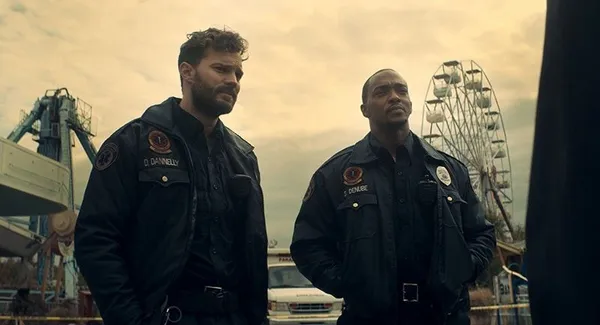Eye For Film >> Movies >> Synchronic (2019) Film Review
Synchronic
Reviewed by: Jennie Kermode

We begin in the back of an ambulance in circumstances so messy and miserable that, taking this together with the chaos that follows immediately afterwards, we might easily believe that we're in some future dystopia, maybe a few years from now when the pressures of worsening weather, shrinking fresh water supplies and decreased habitable land mass have roughed up the world a little more - but we're not, and understanding what that means is key to getting one's head around Justin Benson and Aaron Moorhead's latest genre thriller.
Remember the ending of Bill And Ted's Excellent Adventure? "The best place to be is right here and the best time to be is right now." Well, maybe it was. It's harder to think that way today. There's not much about the major crises facing today's world that science fiction failed to predict, but what's harder to reckon with is the damage done by cynicism itself, the way that every crisis has the potential to be magnified by despair. Synchronic breaks with formula by offering what is ultimately an optimistic narrative, one focused on the fact that, as paramedic Steve (Anthony Mackie) puts it, "the past really sucks."
Life as a paramedic has always sucked to some extent. Never mind the shortage of equipment and the disorganisation that our heroes have to deal with - they're also faced, day to day, with life at its ugliest and most self-destructive. Drug deaths are nothing new but lately they've been seeing something unusual. Little black packets marked with a distinctive logo (one that recalls The Endless) are found beside the bodies - synchronic, a new designer drug, evidently dangerous but not yet banned. Then there are the strange injuries. One man appears to have been pierced by a medieval sword.
"It's quite simple," says the chemist responsible, holding up a vinyl record. "You move the needle to the track you want to play, right? But all of the tracks are there all of the time."
There's big physics here - this is science fiction that cares about the science even it plays out more like fantasy, not simply an action film labelling itself as genre because it includes robots or laser guns. Benson and Moorhead's work stands out primarily because they're interested in ideas. That too feels daring in a world that seems to have less and less time for facts or expertise, and it's more so because they have no time for the populist fanboy culture that might otherwise comprise the film's natural audience. They cast a black actor as Steve for a reason. He's the one who, enabled by a pineal gland tumour that might just be fatal by itself, ends up experimenting with the drug in an effort to save one of its victims. For a black man, travelling back through time, especially in North America, entails risks that a white man just doesn't have to think about.
There's a conversation here that voices on the margins of science fiction have been trying to get going for some years - but it isn't just that science fiction is a white man's genre, it's that when we look at the spacetime occupied by humans, rather than just the bit we're in, the extent of white male domination becomes all the more apparent. Though this isn't perfectly handled at a narrative level (getting an African American writer involved might have helped), it provides the real horror at the core of the film and explains how an imperfect now can still be the best time to be, and worth fighting for.
Along the way, Steve's closeness to his white colleague (and best friend) Dennis (Jamie Dornan) takes in present day experiences of male loneliness and inhibition. It also takes in one of the most curious strip club scenes ever (there's a rumour that these are often included at the behest of funders because they supposedly increase the chances of generating revenue), in which the strippers are off to one side and hardly seen, with neither man showing much interest in them. Conversations are limited to work, family and Steve's lack of family. Relations with female characters are cordial but missing something - there, too, there's a failure to communicate, to step outside safe boundaries. A series of narrow locations seems to suggest that what they both need is to see the bigger picture, even if opening the doors of perception in this particular way is an extreme solution.
It's sometimes said that humanity represents the consciousness of the universe, its means of thinking about itself. Synchronic is science fiction thinking about itself. Underneath a story that sometimes feels overly safe, comfortably conventional, lies something that genre lovers may find profoundly unsettling. The film has received mixed reviews in the wake of its Toronto Film Festival screening. It was never going to be easy to follow The Endless but what Benson and Moorhead have done is just as bold, and for all its flaws, this is a work that future film scholars will likely see as an important step in a remarkable career.
Reviewed on: 17 Sep 2019
















